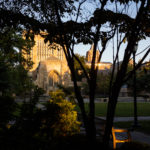New preregistration sows confusion, admin may reexamine details moving forward
The new preregistration system is not without its kinks, but the University has indicated a willingness to adapt the system in response to complaints.

Marisa Peryer, Senior Photographer
Two months ago Yale College announced a new preregistration system for fall courses. The new system, which requires students to register for classes as early as mid-April, is causing headaches for students and professors alike, according to interviews with the News. But Tamar Gendler, dean of the Faculty of Arts and Sciences, said that the University is open to reexamining the details of the course registration system for future years.
Four students interviewed by the News indicated unanimous frustration with the early registration system, particularly in what they claimed was an influx of applications for limited enrollment classes and timing conflicts with housing and finals season. And each of seven professors interviewed by the News found the new system to be confusing, although four expressed that this confusion was to be expected during the transition period.
Although Gendler said the new system brings with it many advantages in terms of providing additional time for classroom planning and finding new classes, she also acknowledged that it brings with it disadvantages surrounding a lack of spontaneity associated with shopping period and shortened time frame for adding and dropping courses.
“It’s clear that we needed to do this for next year in light of the transition from remote teaching to in-person teaching and given the additional number of students who are coming to join us in the fall,” Gendler said. “This is part and parcel of the sort of extra planning that we need to do around so many things,” she said, adding that “it’s hard to say what the ultimate balance is going to be. If the particular preregistration system that we are trying this year doesn’t end up achieving the goals [of introducing students to new classes and allowing for adjustments], we’ll tinker with the mechanism in such a way that we bring these things into balance.”
Yale first announced on March 8 that the traditional shopping period would be replaced by a monthslong system and then, in an April 1 email, extended early registration to June 4, in response to student concerns regarding applying for courses during finals. However, some departments and faculty still kept to the original April 21 preregistration timeline, requiring students to apply for courses in the midst of housing draws and end of the semester exams.
Kamiye Runsewe ’24 found the process “frustrating” because of those conflicting deadlines. She said she was unable to spend much time looking at the course selections and instead rushed to churn out applications.
“I think the fact that we’re having to do this while the semester is going on is not ideal,” Runsewe said. “I know that’s how it is at a lot of other schools, but just because that’s how it is elsewhere doesn’t mean it has to be the same way here.”
For some, like Suzanne Brown ’23, who is on a gap year, the applications themselves were more stressful than the early deadlines.
“I got into my number one class that I really, really wanted to get into, so I feel super grateful about that,” Brown said, adding that she saw a high number of applicants for the class. “But also when I got into the class, I think it was capped at 20 and the professor said he had 122 applications.”
Brown, who will be a junior next year, also expected to receive priority in applications, she told the News. But because so many people applied, some professors emailed and told her that they were instead giving preference to just seniors, she said.
And even though there is a weeklong shopping period next semester, Brown added, professors asked her to let them know immediately if she was planning on taking their class, making her schedule feel much more “concrete” than she would have hoped.
“This is how preregistration works at pretty much every other school,” Brown acknowledged, “but it’s also a reason I think a lot of us chose here. One of the main selling points of the school is that unique ability to kind of do whatever you want for two weeks and figure it out. To eliminate that right now is, honestly, really hurting one of the pillars of what makes Yale a unique school.”
Viktor Shamis-Kagan ’24 agreed, calling his preregistration experience “tough,” especially due to some classes not having syllabi or other information available.
He added that the inaccessibility of some seminars was “frustrating” and, as someone who chose Yale for the small classroom teaching experience, expected to be able to take more seminars with ease.
Professors, though consistently indicating confusion regarding the new system, had varying opinions as to whether or not the frustrations would be short-lived.
William Honeychurch, director of undergraduate studies of anthropology, wrote to the News in an email that the new system is confusing but can likely be attributed to this being its first year in existence.
But Francis Writer in Residence Anne Fadiman wrote to the News that the early registration, while helpful for lectures, is “tough” for creative writing courses.
“It’s hard for students to make decisions about creative classes so far in advance, and it’s even harder to have to choose writing samples and write irresistible statements of interest during the busiest part of the semester,” she wrote.
And for Laura Wexler — professor of women’s, gender and sexuality studies and American studies — the current confusion being felt by all will come to pass by next year. She quoted a scene from the 1998 film “Shakespeare in Love” in an email to the News to demonstrate this point.
“Strangely enough, it all turns out well.”
“How?”
“I don’t know. It’s a mystery.”
The spring term will end on May 19.










